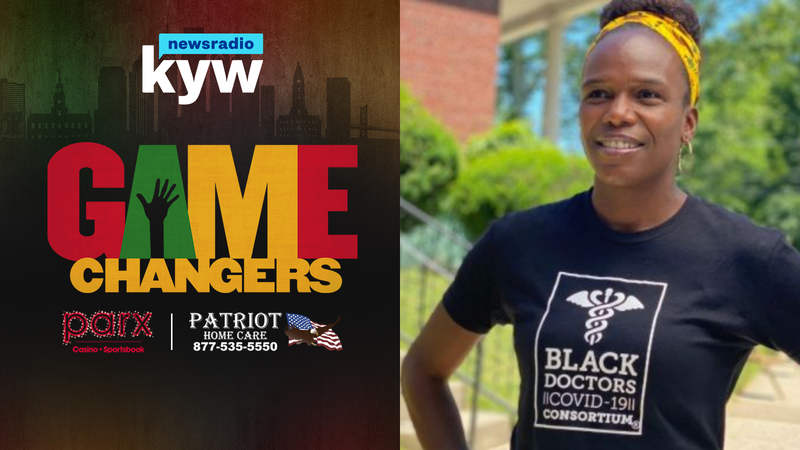
PHILADELPHIA (KYW Newsradio) — When Dr. Ala Stanford realized that Black Philadelphians were disproportionately getting infected and dying from COVID-19 — at least three times greater than white people — she felt compelled to take action.
“I’ll take all of these patients under my responsibility,” she said in April 2020, explaining how she planned to provide free COVID-19 tests to underserved communities.
The pediatric surgeon and business owner founded the Black Doctors COVID-19 Consortium with a posse of doctors, nurses and medical professionals, who volunteered their time to conduct low-barrier coronavirus testing. The nonprofit partnered with Black churches to set up spaces and resources.
“We started this to help those without access who needed education and advocacy and barrier-free testing,” she said earlier this month at a press conference outside Enon Tabernacle Baptist Church.
Stanford’s operating room started to be used exclusively for emergencies due to the pandemic. While sitting at home watching the news, she was moved by the virus’ impact on African-American communities and could not sit idly by.
She established trust with Philly neighborhoods, and the consortium raised tens of thousands of dollars to provide personal protective equipment, transportation and other necessities for the effort. Eventually, the city awarded the group a contract, allowing them to get paid to provide the same service. Their focus was access.
As the COVID-19 vaccine started to roll out, surveys showed that African-Americans were hesitant to get it. Stanford swiftly picked up the mantle to educate the community on the risks.
“It’s not to convince or to coerce,” she said, “but to listen and to educate.”
Initially, surveys showed only 20% of African-Americans were willing to get the vaccine. Over time, that rose to 50%.
Stanford admitted she was not planning on getting the vaccine because she already recovered from COVID-19 and has antibodies. “But what I found is that all people were hearing is ‘Dr. Sanford’s not taking it. She’s not taking the vaccine, so I’m not taking it.’ ”
So, she decided to get the shot on camera.
“I took one for the team,” she added. “This was not about us. This was about you. It’s always been about the community.”
In January, the consortium announced it would start administering the vaccine.
Stanford immediately received thousands of requests online. At that point, only 10% of vaccinations in Philadelphia went to African-Americans. A month later, up to 17%. With 46,000 registration requests, she had to start limiting vaccinations to certain criteria because people outside of Philadelphia were trying to cut the line.
“When we first started vaccinating, it was 89.2% Black, and now it’s 50% Black, and the highest amount of white has been 67% — in North Philadelphia,” she told reporters.
As a wife, mother and public health official, she could not remain silent.
“I can’t do it when it’s always been about equity and access and empathy, which we are still doing it. But now, I am seeing it with able-bodied people coming to get a vaccine and then drive back to their home, which does not have a high positivity rate, while I have 80-year-old people waiting out in the cold because they cannot fill out a form electronically,” she said.
After implementing the restrictions, the disparities decreased.
To expand access to working people, immigrants and other high-risk communities, the consortium is holding a 24-hour “vax-a-thon” from noon on Friday, Feb. 19 through noon the next day. Their goal: vaccinate 2,000 people from hard-hit neighborhoods.
“We’re hoping for a robust turnout,” she said. “If it works well, we’ll do it again next month.”
So far, the consortium has tested 23,000 people and immunized more than 9,000. Stanford and the Black Doctors COVID-19 Consortium are changing the game by battling racial disparities in health care.
“It’s always been about equity and access and empathy,” she said.
KYW Newsradio’s GameChangers honors 10 individuals or organizations that have made a significant, positive impact in communities of color in the greater Philadelphia region. KYW community affairs reporter Cherri Gregg will host a virtual evening honoring this year’s awardees on Feb. 24.
For a full list of 2021 honorees, click here.
